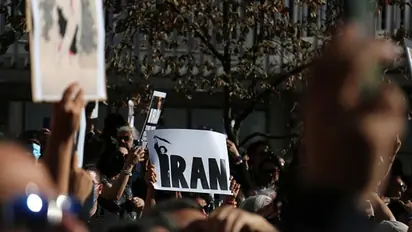Iran police plans to install 'smart cameras' in public places to identify, nab unveiled women

Synopsis
In order to identify and punish women who are not covered up, Iranian authorities have installed cameras in public spaces and major thoroughfares. The action is intended to quell opposition to the hijab law. Since a surge of demonstrations that followed the murder of Mahsa Amini for allegedly violating the country's mandatory dress code, the number of Iranian women who disobey it has grown.
In a further attempt to rein in the increasing number of women defying Iran's compulsory dress code, the police said that officials are putting cameras in public spaces and thoroughfares to identify and punish women who are wearing the burqa. This is part of an ongoing effort to stop the rising number of women who are disobeying Iran's mandatory clothing code.
Violators will get "warning text messages as to the consequences" when they have been identified, according to a statement from the police.
According to the statement, which was reported by the judiciary's Mizan news agency and other official media, the action is intended to "prevent resistance against the hijab law," adding that such resistance tarnishes Iran's spiritual image and fosters insecurity.
Ahmad-Reza Radan, the head of Iran's police, told state television that starting on Saturday, those who remove their veil would be recognised by smart equipment.
People who take off their hijab in public places will first receive a warning before being brought before the courts, according to Radan. If any of their passengers disobey the dress code, he added, car owners will also receive an SMS warning, and if the act is repeated, their vehicles will be impounded.
Since the death of a 22-year-old Kurdish woman while being held by the morality police in September, more and more Iranian women have decided to remove their headscarves. Mahsa Amini was held for purportedly violating the hijab law. Following her passing, security personnel forcibly put an end to the protests.
But although risking arrest for defying the obligatory dress code, women are still widely seen unveiled in malls, restaurants, shops and streets around the country. The morality police are being resisted in videos that have taken over social media.
The requirement for women to wear the headscarf in public was enshrined in law shortly after the Islamic revolution of 1979.
Check the Breaking News Today and Latest News from across India and around the world. Stay updated with the latest World News and global developments from politics to economy and current affairs. Get in-depth coverage of China News, Europe News, Pakistan News, and South Asia News, along with top headlines from the UK and US. Follow expert analysis, international trends, and breaking updates from around the globe. Download the Asianet News Official App from the Android Play Store and iPhone App Store for accurate and timely news updates anytime, anywhere.